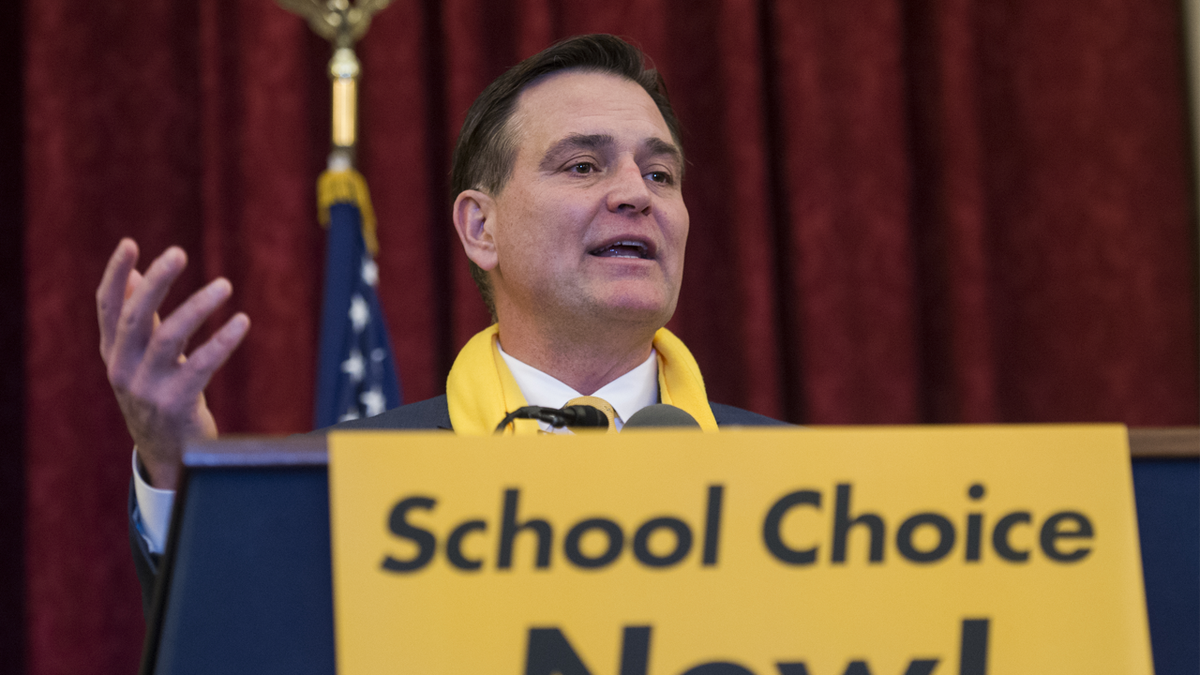School choice advocate calls to ‘defund the universities,’ slams remaining mask mandates in public schools
American Federation for Children senior fellow Corey DeAngelis unpacks the university system and slams the Philadelphia school board for reinstating mask mandates for the 2022-2023 school year.
Frustrated Portland, Maine parents lashed out against the Portland Board of Education for limiting students' ability to choose their preferred high school during a voting session Tuesday night.
At a board meeting on Tuesday, parents were upset to find out that the school board voted to change the district's high school admissions policy, which entails students being randomly forced to attend a school.
Forty-three years of school choice in Portland was changed on Tuesday night when board members discussed a proposal to change the high school selection process due to concern over a "disproportionality of enrollment" and a desire to "limit the difference in class diversity composition."
Portland public school students have been able to select the high school they want to attend since the late 1970s. While one school called Casco Bay High School is not guaranteed admission, all other students were guaranteed entrance at their chosen school Deering or Portland High School. Enrollments in the two high schools have "fluctuated" over time.
OREGON MOMS UNION'S 'LEGISLATIVE PRIORITIES' CALL FOR SCHOOL CHOICE MEASURES AND PARENTAL RIGHTS

Rep. Luke Messer, R-Ind., speaks during a rally to promote the importance of school choice as part of "National School Choice Week," in Russell Building on January 18, 2018. (Photo By Tom Williams/CQ Roll Call) ((Photo By Tom Williams/CQ Roll Call))
Portland Public Schools Superintendent Xavier Botana said that the fluctuation is not "endemic" to either school. However, it is "endemic" that the school district has "these types of variations."
"So, the issue associated with that is–what brings us here … the disproportionality of enrollment causes us to have some pressures on the programming that is available at both schools," Botana said.
"The demographics of the schools have differed significantly over time and I think that that is what prompted a re-evaluation of this when we brought enrollment figures back to the board … the board was shocked to see how disparate the enrollment was," he added.
Board members said they would like to see no greater than a 30-person difference in class size between Portland and Deering. They saw that over the past five years, students' preferred Deering over Portland.
ARIZONA GOVERNOR SIGNED THE MOST EXPANSIVE SCHOOL CHOICE LEGISLATION IN THE NATION INTO LAW
After the changes, which will begin with this year's eighth graders, students will still be able to choose between Portland and Deering high schools. However, the district will randomly select and sort ninth graders into one school to "limit the difference in enrollment, limit the difference in class diversity composition, and cap the percentage of students who do not receive their first choice."
Only students without "diversity factors" will be included in the pool of students who could be moved. Students with diversity factors include those experiencing homelessness, students with individualized education plans, students eligible for free and reduced lunch, and English language or multilingual learners.
The board passed the resolution on a 5-2 vote. What drew ire from parents was the board’s classification of "diversity factors" and how the board reportedly disregarded parental input.

A mother of children in the Los Angeles Unified School District joins members of Los Angeles Leftists for Choice and Unity as they held a rally against the LAUSD student COVID-19 vaccination mandate outside the Stanley Mosk Courthouse. (Al Seib / Los Angeles Times via Getty Images)
A parent of two students in seventh and fifth grade named Ryan Hutchins, who teaches at Deering High School, said during public comment sessions that he supports the amendment because there is a "perception problem that one school is better than the other." The Deering High School alum said that the division has "hurt" the city of Portland.
"I think limiting choice, or I’ve heard the phrase guardrails on choice being put on ... that is a Band-aid. It is a Band-Aid that would be needed. But I think it is one that would cause more animosity than it would help," Hutchins said.
Hutchins' take was in stark contrast to the heated reaction from many other parents.
"As I spoke before, it really doesn't make sense to me that if you're homeless, you're free and reduced lunch, have an IEP or you're an English-language learner that you get your first choice," Ann Marie Gribbin-Bouchard said during the public comment period before the vote on the resolution.
"Let's all remember the definition of discrimination: the unjust or prejudicial treatment of different categories of people or things especially on the grounds of race, age, or sex; this will be discrimination against the population that doesn't fit this criteria."
Much more of the frustration was displayed on the Portland's Board of Education’s comment section under the live stream of the meeting.
"Not one person in the public thinks this is a good idea. Nothing like the split SRO opinion," Carly Peters wrote.
"It’s so disappointing that the Board doesn’t take public preference into account," another commenter, Stephanie Green Albert, said.
"This is discrimination against the population that are in the lottery that is being proposed!" Brian Bouchard said.
Fox News Digital reached out to Portland Public Schools for a comment but did not hear back.
Widespread calls for school choice and parental rights have emerged after states implemented lockdown measures during the coronavirus pandemic.
.CLICK HERE FOR THE FOX NEWS APP
School choice, or providing all families with alternatives to the public schools they’re zoned for, can be expanded through multiple avenues at the state level, including school voucher programs, tax-credit scholarship programs, individual tuition tax credit programs and deductions, and education savings accounts (ESAs). Charter schools, magnet schools, and homeschooling are also forms of school choice programs.
Republican governors made significant inroads in pushing school choice legislation in recent years with many bills including ESAs. For instance, Tennessee Gov. Bill Lee pushed ESAs after being thwarted for almost three years. ESAs in Tennessee would provide eligible families up to approximately $7,000 in public tax dollars on private schooling tuition and other pre-approved expenses.
Additionally, Arizona Gov. Doug Ducey signed the most "monumental" ESA program in the country, allowing savings accounts to have universal eligibility for all 1.1 million K-12 students in the state.



